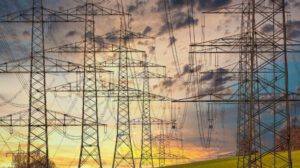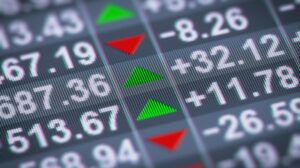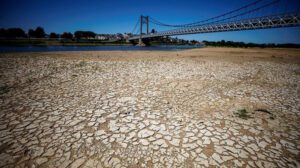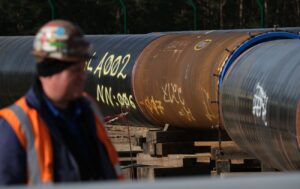
The composite index of the largest companies in the Stoxx Europe 600 region decreased by 0.57% by 11:32 a.m. and amounted to 417.40 points.
The German DAX fell 0.5%, the French CAC 40 – 0.7%, the British FTSE 100 – 0.6%. The Italian FTSE MIB and the Spanish IBEX 35 were down 0.23% and 0.5% respectively.
Traders evaluate the latest statistics from European countries.
Consumer prices in France, harmonized with European Union standards, rose 6.5% year-on-year in August, according to preliminary data from the Insee National Statistical Office. Thus, the growth rate slowed down compared to 6.8% in July. Analysts had expected weakening to just 6.7%, according to Trading Economics.
Meanwhile, French consumer spending fell 0.8% in July from the previous month. The average forecast of experts assumed a decline of 0.3%, according to Trading Economics. Bloomberg respondents had forecast a 0.2% contraction.
French GDP increased by 0.5% in the second quarter compared to the previous three months, according to final data from the national statistical institute Insee. The final data coincided with the preliminary estimate. Analysts, on average, did not expect a revision, according to a Trading Economics poll.
The number of unemployed in Germany in August increased by 28 thousand – up to 2.497 million, according to the data of the Federal Employment Agency of Germany. The rise in the indicator was noted for the third month in a row.
Unemployment rose to 5.5% from 5.4% a month earlier.
Experts polled by Bloomberg predicted, on average, an increase in the number of unemployed by 28.5 thousand and a rise in the unemployment rate to 5.5%. Respondents of Trading Economics assumed an increase in the first indicator by 28 thousand and an increase in unemployment to 5.5%.
The drop leaders among Stoxx Europe 600 components are shares of the Polish supermarket chain Dino Polska, which shed 4.3%.
Airbus SE shares are down 1.9%. European Aerospace Corporation CFO Dominic Asam will leave his post in early March next year, the company said in a statement. He will take the position of CFO of SAP SE.
Danske Bank AS added 0.4% in price. A Danish bank will write off the debt of 90 thousand customers in connection with the discovery of errors in debt collection systems.

The income of NPC Ukrenergo from the sale of the interstate section for the export of electricity to Romania and Slovakia from June 30 to August 31 rose to UAH 2.94 billion.
According to the results of daily auctions held by Ukrenergo in these areas, in the last ten days of August, proceeds from the sale of cross-sections increased by UAH 1.02 billion due to an increase in electricity prices in Europe, which directly affects the price of cross-sections. As a result, exports to Romania for ten days cost UAH 502.1 million, which is 39% higher than in the third week of August, to Slovakia – UAH 519.5 million (63% higher than the average daily cross-sectional cost in the third week of August).
The most expensive was the section on the last day of August – in Romania 56.8 million hryvnia, in Slovakia 59.4 million hryvnia.
On the same date, a new record was also set for the maximum hourly price of a section – UAH 22.1 thousand / MWh in Romania and UAH 23.7 thousand / MWh in Slovakia (previous records were UAH 21.7 thousand, respectively) /MWh and 21.27 thousand UAH/MWh).
According to Energy Reform calculations, the average hourly price of a section for ten days of August amounted to UAH 16.7 thousand / MWh in Romania, and UAH 17.3 thousand / MWh in Slovakia.
According to the Market Operator, as of August 31, the average electricity price on the day-ahead market (DAM) in Romania is EUR684/MWh (in terms of the current euro exchange rate, about UAH 25,000/MWh) , Slovakia – EUR 673 / MWh (about 24.6 thousand UAH / MWh). In Ukraine, the electricity price of the BASE period on DAM is EUR 86/MWh (about UAH 3.14 thousand/MWh).
The most active exporter is the state-owned energy trader AK ECU, which entered the market on August 19. Of the possible 3,000 MWh per day, the company buys a section for export via the Romanian direction of 1488 MWh per day (62 MW per hour of the day), along the Slovak route – for the supply of 1512 MWh per day (63 MW per hour).
The second largest exporter in both directions remains DTEK Zakhidenergo, which bought out during this period mainly a cross-section for deliveries from 1,000,000 MWh to 1,200 MWh.
Most of the remnants of the cross-section were bought out by Latest Technologies 3000, Ukr Gas Resource, Electric Trading Group, and DE Trading. Many companies participated in auctions without results.
The state-owned PJSC “Ukrhydroenergo” continued to buy a section of 100 MW on a flat schedule for the supply of electricity to Moldova (a total of 2400 MWh per day).
The section to Poland continues to buy back at daily auctions in addition to the 147 MW of capacity bought out at the monthly auction of DTEK Zakhidenergo – on August 22-31 at 63 MW every hour (1512 MWh per day),
Sections from Slovakia, Romania and Moldova at daily auctions for the last ten days of August traditionally remained not redeemed.
The section price at all auctions, except for exports to Romania and Slovakia, is 0 UAH/MWh.
As reported, on July 28, ENTSO-E increased its capacity for export to Romania and Slovakia to 250 MW. Ukrenergo held a daily auction on the same day, dividing the capacity equally. A month earlier, commercial exports began with 100 MW to Romania, from July 7 they were shared with Slovakia for 50 MW.
According to the Ministry of Energy, technically, Ukraine can already export at a capacity of 1.5-1.7 thousand MW and expects an increase in exports over time.
The head of Ukrenergo, Volodymyr Kudrytsky, noted that he expects a decision to increase exports from the Europeans on September 2.

Investors are awaiting a speech by US Federal Reserve Chairman Jerome Powell at the annual economic symposium in Jackson Hole. Powell is expected to reiterate the US central bank’s commitment to rapidly raising rates to curb inflation.
Also in the spotlight is the news that British energy market regulator Ofgem will raise its electricity bill cap by 80% to £3,549 a year in October, after raising it by 54% in April.
The composite index of the largest companies in the region Stoxx Europe 600 by 10:59 Moscow time increased by 0.09% and amounted to 433.77 points.
The German DAX index rises by 0.32%, the French CAC 40 – by 0.27%, the British FTSE 100 – by 0.47%. The Italian FTSE MIB and the Spanish IBEX 35 are up 0.31% and 0.41% respectively.
French consumer confidence rose unexpectedly to 82 in August from 80 in July, the lowest level since June 2013. The indicator rose for the first time in eight months. Analysts on average predicted the indicator at the level of 79 points, writes Trading Economics.
Leading index of consumer confidence in Germany, calculated by the research company GfK, fell to a minimum since 1991, due to concerns about rising energy prices.
The value of the September index fell to minus 36.5 points compared to minus 30.9 points a month earlier. Analysts on average predicted a decline to minus 31.8 points, according to Trading Economics.
Shares of SAS AB rise in price by 1%. The Scandinavian airline increased its net loss in the third quarter of fiscal year 2022 due to flight cancellations and pilot strikes.
The price of Deutsche Lufthansa AG shares increases by 0.2%. The German carrier intends to continue talks with the union representing the company’s pilots amid wage disputes that threaten the company with strikes. Meanwhile, the union has already begun preparations for a strike.
Among the growth leaders in the composite regional index are traded shares of SKF AB, which produces health and hygiene products, (+6.2%), the Swedish oil and gas Orron Energy (+4.9%) and the Swiss online pharmacy Zur Rose Group AG (+ 3.8%).

A number of EU regions will experience an unprecedented drought for another three months, the Associated Press reported on Wednesday, citing an EU report.
Drought and high air temperatures are expected in the western Mediterranean until November 2022, the report says.
It is noted that in particular this will affect Portugal and Spain.
Nearly half of the EU countries currently have a drought warning in place. In addition, the deterioration of the situation is observed in Belgium, France, Germany, Hungary, Ireland, Luxembourg and others.
Earlier it was reported that, according to the Joint Research Center of the European Commission, the current drought seems to be perhaps the worst in the last 500 years. Final data at the end of the season may confirm this preliminary estimate.
The countries of Europe, which this summer are suffering from wildfires associated with abnormal heat and drought, broke a sad record in 2022: 662.8 thousand hectares were devastated by fire.
Among the states most affected by fires this year are Spain (246 thousand hectares of burned forests), Romania (150 thousand hectares), Portugal (75 thousand hectares) and France (61 thousand hectares).

The spot price of gas in Europe soared above $2,700/ths. cube m for the news about the new repair on the Nord Stream highway.
The price of the nearest (September) TTF futures on the ICE Futures exchange on Friday evening reached $2,712 per thousand cubic meters.
On Friday evening, Gazprom announced that the only working gas-compressor unit of the Nord Stream main’s departure compressor station at the Portovaya CS would be shut down from August 31 to September 2 for three days for maintenance and scheduled preventive work.
The gas pipeline is capable of transporting up to 167 million cubic meters per day. m of gas, but the capacity was reduced due to the violation of the maintenance schedule for the equipment of the starting station of the sea main – the compressor station “Portovaya”. It is equipped with gas compressor units from Rolls-Royce, whose gas turbine business has been taken over by Siemens. Due to Canadian sanctions imposed in response to the military aggression of the Russian Federation in Ukraine, one turbine did not return to Russia from the Siemens Energy repair base on time. In the meantime, the time has come for a major overhaul of other engines, both in connection with the operating time between overhauls and in connection with breakdowns.

The lowest corn harvest since 2007-2008 is expected in the countries of the European Union, which is caused by an abnormal drought that has gripped the main corn-producing countries in the past few weeks.
Against this background, the EU imports 13 million tons of corn from Ukraine to cover its needs, according to the website of the electronic grain exchange GrainTrade with reference to the report of the chief analyst of Argus Media (France) Nathan Cordier, which he announced during the meeting of grain traders “Trend and Hedge Club”.
According to him, Bulgaria, Romania and Hungary are the largest corn producers in the EU, and production performance in these countries will be disappointing in 2022.
“We expect Romania to harvest 8 million tons of corn, Hungary 4.5 million tons, and Bulgaria 15 million tons. These countries exported corn to Spain, Italy and Turkey, which were the main markets. low harvest in Brazil, exported grain to the Middle East and North Africa. This season, we expect that the supply of exports will be low,” GrainTrade quoted Cordier’s report as saying.
The expert noted that three heat waves have occurred in France since the beginning of corn sowing, so its harvest is expected at 11.2 million tons, and will be harvested from only 68% of the area. Thus, the yield of corn in France will be only 8 tons / ha, which is the worst result of the country in the last 20 years.
According to Cordier’s forecasts, Europe will be forced to import 23 million tons of corn to cover its needs, of which it will import 13 million tons from Ukraine, and another 5 million tons from Brazil.
As reported, the Minister of Agrarian Policy and Food Mykola Solsky in early August announced an increase in the forecast for the harvest of grain and oilseeds in Ukraine this season by approximately 5-7 million tons – up to 65-67 million tons from 60 million tons.
At the same time, in the July report, the US Department of Agriculture forecasts the harvest of Ukrainian wheat in the 2022/2023 marketing year (MY, July-June) at the level of 19.5 million tons, its export – 10 million tons, domestic consumption within the country – 10.2 million tons. The corn harvest is estimated at 25 million tons, export – 9 million tons, domestic consumption – 10.7 million tons.
In early July, the Ukrainian Grain Association (UGA) increased the forecast for the harvest of grain and oilseeds in Ukraine in 2022 by 4.4% compared to the May forecast – up to 69.4 million tons from 66.5 million tons.
According to her forecasts, in 2022, a wheat harvest is expected at the level of 20.8 million tons (+ 8.3% compared to the organization’s May forecast); 27.3 million tons of corn (+4.6%); 6.6 million tons of barley (forecast kept); 9 million tons of sunflower (forecast kept); 2.2 million tons of soybeans (+4.7%); 1.5 million tons of rapeseed (+13.3%).